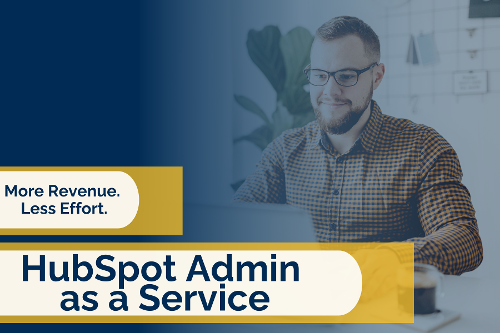
We hold a monthly, internal AMA at Lift as a way to ensure everyone is “in the know,” and to help us stay aligned as we grow. Our staff has nearly doubled in the last 12-15 months so it’s also a great way to be reminded about the ideas and insights we’ve shared previously.
At a recent AMA one of our newer team members asked me to explain more about something I’d said in an early episode of The RevOps Show.
I said that as the HubSpot admin function exists because of a problem and can serve to institutionalize that problem. I hold a monthly internal Ask Me Anything (AMA) at Lift, and was asked about what that meant. I thought it was a big enough issue that it would make sense to write a blog about why HubSpot admins often end up spending their valuable time managing chaos.
The moment you define something by a problem, you institutionalize the problem. You don't eliminate the problem. You actually feed the problem. For example, all we all know, US healthcare isn’t really about managing health; it’s about managing sickness.
In the RevOps world, the HubSpot admin is a role that’s been defined by the problem. If an admin is hired to manage HubSpot, they'll see their purpose as keeping the CRM clean.
Unfortunately, that puts them in a no-win situation.
Line of sight tends to be anchored by the lowest-level repeatable activity. An admin who is constantly updating CRM—a necessary activity—will begin to define that activity as the key element of their role. It becomes the end goal, instead of a means to an end.
Putting aside the fact that there's no such thing as "clean," that admin will do their damnedest to keep HubSpot clean. And here's the catch: the things that enable them to keep it the cleanest are usually getting in the way of the business outcomes enabled by a well-run CRM.
And most job descriptions put the full responsibility for a clean CRM squarely on the HubSpot admin's shoulders, even as tools have become easier to use and more accessible. That brings more chaos into the equation.
I liken it to PowerPoint. Before PowerPoint, a deck took weeks or even months to create and you needed significant expertise. Now kindergartners can create decks. The result? If you walk into a sales organization and ask to see the official deck everyone's supposed to be using, you can find 79 versions.
When something becomes really simple and there's no oversight, the result is anarchy.
I truly believe that, in 98% of cases, a CRM problem isn't actually a CRM problem. It's a business process problem. Mayhem ensues when leadership fails to make important decisions about business process.
This phenomenon explains why HubSpot admins are often hired to manage chaos. But it doesn't have to be that way.
If you're thinking of hiring a HubSpot admin—or if you already work with one and they spend their day putting out fires, keep reading.
I'm going to outline three common mistakes to avoid, as well as how to set your HubSpot admin and your company up for success.
3 mistakes that will undermine the effectiveness of your HubSpot Admin
1. Thinking it's a tech role - Yes, a HubSpot admin needs to have technical skills and administer the software, but the main purpose of the role is to support business processes. As the kids say, periodt. (No, fellow olds, that's not a typo.)
It's true that, historically, the role of Salesforce admin was very much like a typical admin role supporting any other piece of technology. And I won't lie: tech skills are necessary, but times and technologies have changed.
If you hire purely for technical skills, that means your new employee will primarily view things through the lens of technology. As a result, technology, not business needs, will drive their approach.
Add in the fact that any technology is some form of automation—and automation magnifies any type of misalignment or conflict. The result? Chaos.
If you are hiring a HubSpot admin to primarily administer tech and keep your CRM clean, you're essentially hiring a very expensive traffic cop. You must hire someone with technical knowledge who can support your go-to-market processes.
What you need is a "translator"—someone who understands enough about the business process to grasp the underlying objective; they must also understand that technology's purpose is to serve as a tool to obtain that goal.
2. It's not an admin role - I know the title says it is, as do most job descriptions, but that's a historical holdover from when the CRM required a much more specific technical skillset.
What you need is a process accelerator. Many people view the HubSpot admin's main role as an executor who does what's requested. They're viewed as someone whose aim is to block bad moves instead of enabling successful ones.
But if you've hired correctly and defined your objectives and processes, the HubSpot admin role should function as a subject matter expert who facilitates solutions. For example, if a VP of Sales comes to them with a request, they should be able to dig into why the request is being made—because chances are, there might be another, better way to accomplish that objective.
3. Focusing on the wrong objectives - Many people view the HubSpot admin's main role as an executor who does what's requested. They're viewed as someone whose aim is to block bad moves instead of enabling successful ones. Sure, the admin needs to manage the CRM, but shouldn't be their primary objective.
The real objective—and why I said you want to hire a process accelerator—is to leverage the CRM as a tool to gain more velocity and traction.
If you've defined your organizational outcomes, the admin's objectives need to be in alignment with those bigger goals.
There's another part to this. If your HubSpot admin's primary role is simply to manage the CRM, they will quickly fill the role of either a bottleneck or the "compliance police." That sets the role—and your company—up for failure.
For example, the vast majority of salespeople take the quickest path to win a piece of business because they are compensated when they sell. You can tell them that if they don't log things into the CRM, they won't get paid, but at the end of the day, if they're winning business and someone threatens not to pay them, they'll just go somewhere else. That doesn't mean salespeople are off the hook, but you need someone who can problem-solve instead of simply chasing people.
If you've gotten this far, you might be saying, "FINE, Doug, I get it. But what should I do if I need to hire a HubSpot admin or if my current admin is managing chaos?"
4 Ways to Rein in HubSpot Admin Chaos
1. Keep working on your business process
If your business processes aren't optimized, any HubSpot administrator you hire will use their skill set to manage chaos instead of advancing your business. If this is happening, it's a good sign you need to improve your business process.
But that brings me to another point—no one is ever finished working on business process. In an ever-changing environment, you'll never be able to dust off your hands and declare yourself done.
There is ever-present ambiguity in business that results from working with the dynamic adaptive nature of complex systems. Once you accept that, a lot of these other questions get much simpler to answer because you've got a better picture of what needs to be managed within your system.
2. Develop a prioritization schema
One common source of chaos, especially in small to mid-market businesses, is trying to fix every identified issue at one time. That's impossible.
Here's where you need to focus on the 3 Zones of Execution and ask:
-
Where are we now as a company?
-
Where do we want to be?
-
What's the iterative path to get us there?
Map out a plan and prioritize what needs to be done first.
3. Don't define their role by the problem:
Define their objectives and the job to be done. You don't want your HubSpot admin focusing on the lowest common denominator; they should be thinking about how to most effectively advance your company's goals.
4. Set your admin up for success
This means defining the outcomes correctly, providing the resources, and giving them appropriate authority. Most HubSpot admins are given a lot of responsibility, but they have no authority. That's a recipe for chaos—not to mention, frustration across the board.
As you may have gathered, an effective HubSpot admin must possess a strong mix of technical skills and business acumen. It's also not a "set it and forget it" kind of position; someone must be actively managing this role.
If you're not ready for that—and many companies aren't–Lift's HubSpot Admin as a Service provides a dedicated team of experts with the knowledge and skill set from hundreds of successful implementations. Your team members take care of everything from day-to-day admin and troubleshooting to offering data-based insights and recommendations to make your business operate more efficiently. You can read more about it here.

 Doug Davidoff
Doug Davidoff